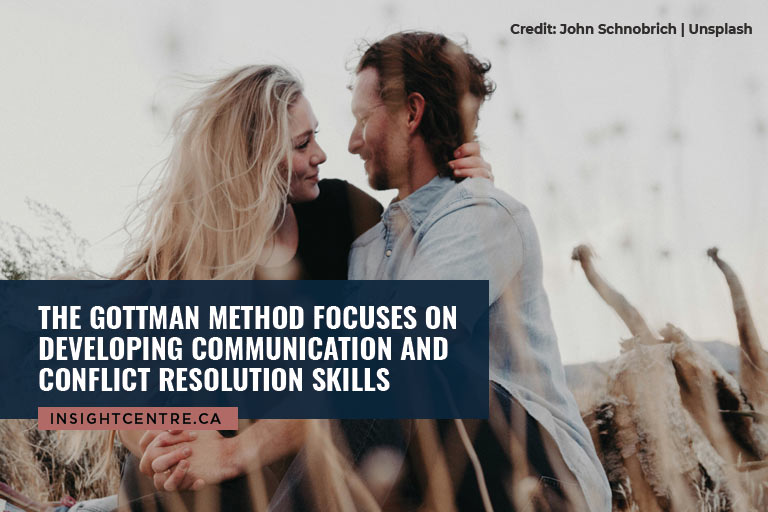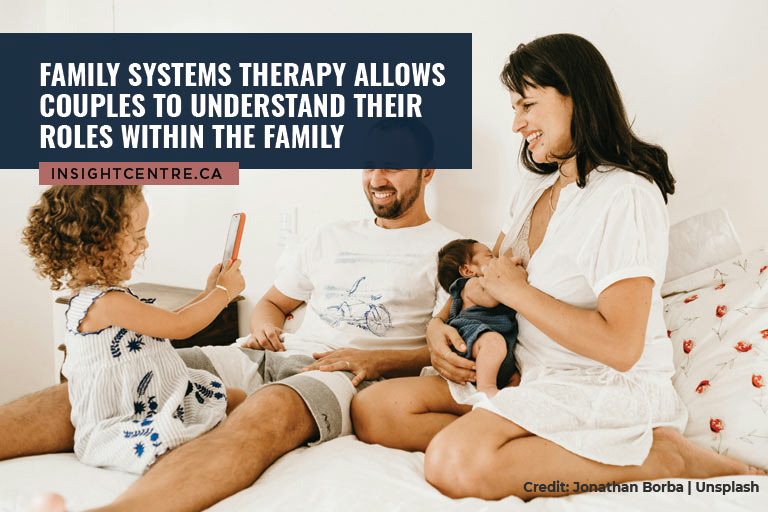
Couples counselling at Insight Centre offers a transformative approach to addressing relationship challenges. Using methodologies such as The Gottman Method and Family Systems Therapy, these sessions aim to foster understanding, communication, and connection between partners.
Whether you’re encountering obstacles in communication, intimacy, or partnership dynamics, Insight Centre’s experienced psychotherapists guide couples toward a healthier, more fulfilling relationship.
This article explores what couples can expect during their counselling journey at Insight Centre, focusing on the therapeutic approaches and outcomes.

The Gottman Method, developed by Drs. John and Julie Gottman, is a research-based approach to couples therapy that focuses on strengthening the relationship through effective communication, conflict resolution, and ways to support each other’s dreams and aspirations.
It is grounded in the concept of the “Sound Relationship House,” which includes 7components crucial for a healthy relationship:
Couples are encouraged to know each other deeply, understanding each other’s worlds, including hopes, stresses, and dreams.
This involves expressing respect and appreciation for each other, highlighting the positive aspects of the relationship.
Partners learn to respond to each other’s bids for attention, affection, and support, fostering emotional connection.
Partners are encouraged to keep a positive perspective about problems in the relationship, believing that your partner has good intentions.
Through this modality, partners can develop strategies for handling disagreements constructively, without damaging the relationship.
The foundation of this component is to teach couples to support each other’s aspirations and dreams, finding common ground and compromise.
Partners build a sense of purpose and shared narratives, including rituals, goals, and family culture.

Family Systems Therapy examines the family as an emotional unit, suggesting that individual behaviours are best understood within this family context. It posits that patterns developed in early family life influence the way individuals interact in all relationships.
For couples, this means exploring how each partner’s family dynamics influence their current interactions and how they can develop healthier patterns together.
Couples learn about the roles they’ve adopted from their families of origin and how these play out in their relationship.
Therapy uncovers recurring patterns in family histories and their impact on the couple’s dynamics.
Couples work on establishing boundaries that respect each other’s independence while fostering closeness.
Emphasizes clear, direct communication, helping partners express their needs and listen empathetically to each other.
Guides couples in resolving conflicts by understanding underlying family dynamics, rather than focusing solely on the surface issues.
In couples counselling, tracking progress is essential for motivating couples and adjusting therapeutic strategies. Progress can be measured through:
This involves noticing a shift towards more open, respectful, and understanding conversations between partners.
This means seeing a decrease in the frequency and intensity of conflicts, with conflicts resolving more constructively.
This involves observing an increase in emotional and physical intimacy, showing a deeper connection and bond.
This involves monitoring whether the objectives set at the beginning of therapy, tailored to the couple’s specific needs and situations, are met.
Progress is a sign that the strategies employed are effective, and it encourages further engagement in the therapeutic process.
Addressing individual issues within the context of couples counselling is crucial for a few reasons:
Often, personal issues such as anxiety, depression, or past trauma can significantly impact relationship dynamics. Addressing these through individual counselling can lead to more effective couples therapy.
Individual growth contributes to a healthier relationship. As individuals become more self-aware and emotionally healthy, their capacity to contribute positively to the relationship increases.
It ensures that one partner’s issues do not overwhelm the couple’s dynamic. By addressing personal challenges individually, both partners can engage more fully and equally in the relationship.
Working on personal communication skills can improve how partners interact with each other, making couples counselling more effective.
Focusing on individual issues helps create a more balanced and supportive relationship, where both partners are better equipped to contribute to their collective well-being.
A tailored approach in couples counselling ensures that therapy is responsive to the unique needs, backgrounds, and goals of each couple. This customization is vital because:
Every relationship has its unique challenges and dynamics. The psychotherapist will develop a plan based on these and adjust accordingly as therapy progresses.
This means that the psychotherapist respects and incorporates the couple’s cultural, religious, and personal values.
This allows therapists to use a blend of therapeutic techniques that best suit the couple’s situation.
A tailored approach maximizes the effectiveness of therapy, ensuring that both partners feel understood and supported throughout the process.
The Significance of Commitment to the Process
Commitment to the couples counselling process is fundamental for several reasons:
Successful counselling requires time and effort from both partners. A commitment ensures that both are willing to put in the necessary work.
It signifies readiness to explore difficult topics and make needed changes within the relationship.
Regular attendance and engagement with the process facilitate continuous improvement and the application of strategies learned in therapy.
Commitment to counselling is also a commitment to personal and relational growth. It demonstrates a desire to invest in the health and future of the relationship.
The process can be challenging; commitment fosters resilience, helping couples stick with therapy during tough times, ensuring they reap the long-term benefits.
Commitment to the counselling process is crucial for achieving meaningful and lasting improvements in the relationship.
Couples counselling offers a pathway to understanding and improving your relationship through proven methods like The Gottman Method and Family Systems Therapy. Whether you’re facing communication challenges, trust issues, or just want to strengthen your bond, counselling can provide the support and tools you need.
For those seeking couples counselling near you, the Insight Centre Counselling & Psychotherapy offers experienced psychotherapists providing couples counselling in Barrie. To learn more about how we can support your relationship, call us at +1 647-633-1928. Start your journey towards a healthier, happier relationship today.
Copyright 2025 Insight Centre | All Rights Reserved | Sitemap | Powered by: Local SEO Search Inc.